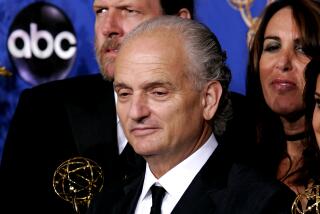Why No Outrage Over the Offensive Stereotypes on ‘Sopranos’?
- Share via
Imagine, if you will, an updated television version of the old radio show “The Goldbergs,” in which the normal, middle-class Jewish patriarch pulls off some financial scams on the sly. How about a show called “The Tongs,” where the normal, middle-class Asian American dad operates a
heroin ring out of the back of his popular Chinese restaurant?
Would such shows be considered preposterous and racist? Absolutely, and with good reason: They promote gross,
one-dimensional stereotypes of individual American groups. Yet a current television show, HBO’s “The Sopranos,” not only revels in negative, cartoonish images of a specific community--Italian Americans--but was congratulated for doing so last week by a flurry of Emmy nominations from the television industry. How can this be?
As everyone knows by now, “The Sopranos” has become a cult favorite among critics and audiences. Ostensibly, it deals with a normal, middle-class Italian American father (James Gandolfini) going through a midlife crisis. And what does this all-American Everyman do in his spare time? He shoots people in the head. Just like you and me.
Look beyond the show’s surface details, however, and what you’ll see is culturally respectable prejudice being passed off as satire.
Although America still has a long way to go in eradicating racism, we have made strides as a society by eliminating blatantly racist images of individual American groups. Stepin Fetchit, the “red savage” Indian, Shylock the Jew, the Frito Bandito, the inscrutable Oriental--these and other hurtful images are persona non grata in American popular culture.
And yet images of Italians as gun-toting psychopaths inexplicably continue to flourish--and, more inexplicably yet, earn reams of critical praise, even awards.
Popular American mythology holds that Italians never reached these shores until the 1890s. In fact, Italians have maintained a presence in North America from the very beginning.
Many major explorers of the continent were Italian, either on land (Chino, Malaspina, Vigo) or by sea (Columbus, Cabot, Vespucci and Verrazano). Thomas Jefferson’s best friend and neighbor, the Italian political writer Filippo Mazzei, is credited with inspiring the phrase “all men are created equal.” The U.S. Marine Band was formed in 1805 under the baton of Maestro Gaetano Carusi. And vibrant Italian communities were already well-established in California and Louisiana long before the Civil War.
Mass Italian immigration did hit a peak between 1890 and 1910, though, arousing the fears and suspicions of many, including the so-called yellow journalists. These precursors of modern-day tabloid reporters had a field day portraying the new immigrants as crude, bloodthirsty killers--or, more benignly, as dimwitted dunces who would forever be out of place.
Predictably, these same attitudes were picked up by the new media of movies and television. The popular press focused exclusively on people such as Al Capone and Lucky Luciano, transforming these common thugs into larger-than-life, mythological figures--in short, the “official” representatives of Italian American culture.
The turning point came in 1969 with the phenomenal financial success of the late Mario Puzo’s fictional pulp novel, “The Godfather.” Before that, Italian gangster images, like images of other groups, were considered antiquated and offensive, something you wouldn’t bring up in polite company. Yet Puzo’s book, along with Francis Ford Coppola’s lush, romantic treatment of it three years later, literally enshrined Italian stereotypes, made them respectable. It has been a nonstop orgy of defamation ever since.
Italian thug stereotypes are such an entrenched staple of popular entertainment now--quaint and cozy, as it were--that no one even questions their accuracy regarding Italian American history. It’s all “for fun.” It has led, sadly, to an erosion of Italian American self-respect, an apathetic, shoulder-shrugging attitude of, “Oh, it’s only a movie.” And yet, as quickly as we dismiss “just another movie,” more and more of them keep piling up, creating a cultural Berlin Wall of stereotyping.
The end result, as we can see it, is the no-holds-barred success of “The Sopranos,” a show that not only exploits popular prejudice about Italian Americans, but allows audiences to giggle at such images guilt-free, as naturally as breathing.
Italian Americans everywhere really need to wake up and smell the cappuccino.
More to Read
The complete guide to home viewing
Get Screen Gab for everything about the TV shows and streaming movies everyone’s talking about.
You may occasionally receive promotional content from the Los Angeles Times.






